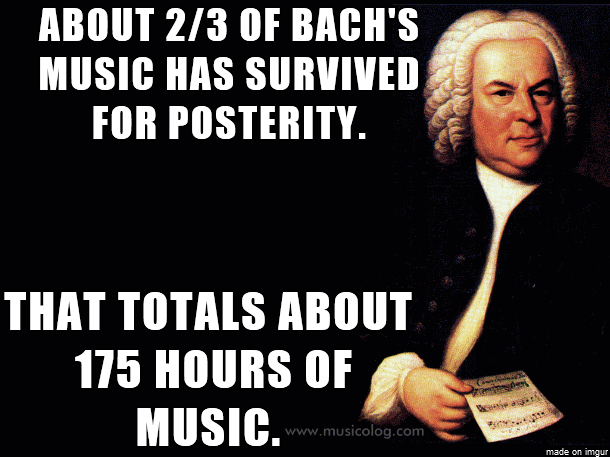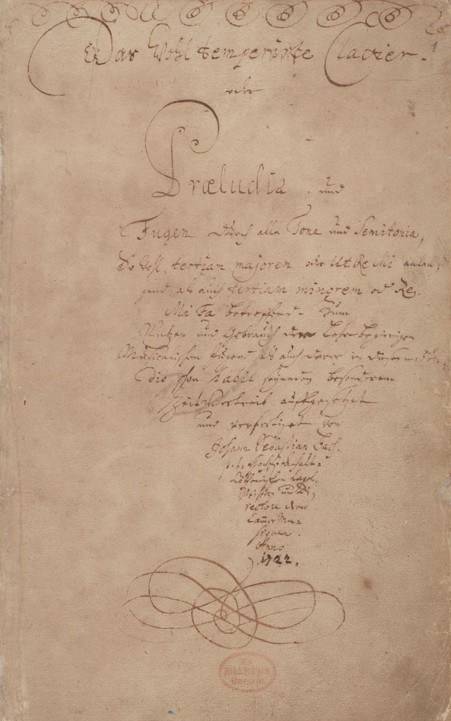The Daily Bach Project is a repertoire challenge involving the complete Well-Tempered Clavier. Week by week, the process of learning a different prelude and fugue is documented on a public blog and Instagram.
♦♦♦♦
The big question: Why?
I was a pianist who could have done without Bach.

After method books, much of my early training focused on small works of Mozart, single movements of Beethoven sonatas, and shorter lyrical pieces of Mendelssohn. I remember the first time my teacher mentioned that I should play Beethoven—it felt like a milestone, a moment that certified me as something more than just a kid playing cute songs from the Bastien method. I’m not sure why, exactly, he shied away from assigning me any Bach (or why I didn’t consider Bach to be just as much a milestone as Beethoven). It’s likely he wasn’t used to teaching children who had the interest, patience, and ability for such demanding repertoire; style and counterpoint, two of the most important elements of Baroque music, was never discussed (likely for the same reasons). I never blamed him for my lack of exposure to pre-Classical music—I was happy with my Beethoven sonatinas—but, after transferring studios in high school, I walked away with the idea that Bach wasn’t necessary to my enjoyment of playing music.
Past that point, numerous teachers insisted I not only play Bach but that I understand why I need to, and rightly so. For years, I resisted; then came undergraduate auditions. Required repertoire ranged from “1 work in the Baroque style” to “a complete prelude and fugue from the Well-Tempered Clavier” to “a large work composed before 1750, such as a suite or concerto.” Speed-learning became the new normal, to the point that I foolishly gave myself three weeks to learn a prelude and fugue, not having ever played one before. I remember asking the faculty at that particular audition if I was permitted to use sheet music, due to my lack of preparation time (a memory which is now utterly embarrassing).
I played more preludes and fugues in college (from memory) but still never grasped the structure and beauty of counterpoint, let alone how to express those things myself at the piano. Perhaps the immaturity of my mindset left me apathetic to the pursuit of finger independence and clarity of layers. I learned the G Major fugue in Book 2 as if it were a homophonic piece that’s harmony happened to change every…sixteenth note?
My teacher in graduate school wasn’t having it and I spent nearly a year and a half adapting to his rigid standards of how to achieve a characteristically Baroque sound and how to conceptualize the counterpoint in the music while I played. It was a challenge, but one I grew to desire, as I could sense my own development. I also grew to hear the effect (and affects!) of Bach on other composers, not least in Beethoven and later Mozart, but in the twentieth century music I’ve always felt most at home with. The Second Viennese School, Bartok, Stravinsky, Debussy, all embracing of the Old Wig.
After completing my academic degrees, I feel the continued need to push myself without the help of academies or conservatories; one could say those institutions have done their job well: they’ve produced someone who no longer needs their services, but who still seeks challenges and inspiration from those pillars of culture that millions have found so meaningful. For this project, however, it’s not just my own spirit that will help nudge me along—it’s the public at large.
I’m learning the complete Well-Tempered Clavier, Bach’s grand experiment in a new system of tuning a keyboard instrument to play in all 24 major and minor keys. One prelude and fugue per week.
Throughout the process, I’ll be blogging weekly about a specific aspect of the music I find interesting, or even something I’m struggling with. That blog can be found HERE. I also encourage you to follow the entire process on Instagram (@dailybachproject). My goal for this tell-all approach simple: accountability through disclosure. Traditionally, musicians are concerned with the ultimate step in their repertoire, the performance. I’m more interested in the journey without a point-of-arrival in mind. Thus, being upfront with my own struggles along the way are at the heart of the Daily Bach Project.
I’ve additional elements planned for this in the more-distant future, but for now join me in the appreciation and joy of Bach’s monolithic set of pieces designed “for the profit and use of musical youths desirous of learning, and especially for the pastime of those already skilled in this study.”

